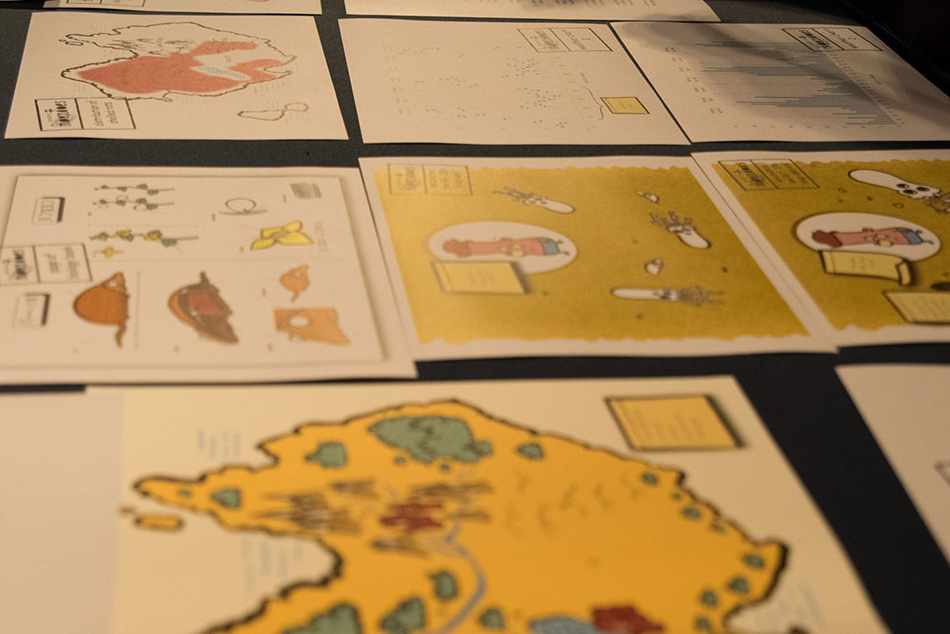
The inquiry-based science education game Expedition Mundus, created by the Dutch Young Academy in 2011, offers a tangible example of the type of project promoted by the GYA towards globalising best practices. The aim of this activity by the GYA working group on Science Education for Youth is to make the game available to children across the world.
In this game, high school students take on the role of researchers exploring an unknown planet called Mundus. They try to find out as much as possible about the planet itself, its nature, culture and inhabitants. The students answer questions based on available material on Mundus including observations, notes of other researchers and ancient sources of the Mundians. In short, the children think like scientists, formulate hypotheses, test them and then report the results.
Watch the Expedition Mundus group’s video for the 2020 GYA e-Annual General Meeting here.
N/A
Printing of some copies of the English-language version of the Mundus game each year continued pre-COVID-19, and is likely to pick up again for distribution among GYA members at the 2023 GYA Annual General Meetings so that the game can be used more widely.
Members of the group continues to promote the science game in various countries all over the world.
The following language versions of Expedition Mundus are currently available: Dutch (2011), English (2014), German (2015), Swedish (2017), Hebrew (2018), Arabic (2018, led by the Israel Young Academy), Indonesian (2018; basic game level only), Japanese (2021).
The opening video with instructions on how to play the game, is currently available in Arabic (2019), and Hebrew (2019).
In March, group member Lahcen El Youssfi (Morocco) organised a Mundus game session at the Khenifra Higher School of Technology Sultan Moulay Slimane in Morroco. The activity aimed at introducing the Mundus game to a group of students of the Moroccan Young Leaders EST Khenifra team (JLM EST Khenifra). The team was impressed by the science game and they were happy and ready to run it with the activities of the Science Week of Sultan Moulay Slimane University at the level of other schools and faculties. Unfortunately, the Science Week then had to be postponed due to the Covid-19 pandemic.
In February, group co-lead Thomas Edison dela Cruz (Philippines) took the Expedition Mundus game to highschool teachers in the Philippines. See a brief report here.
Expedition Mundus digitized by Dutch & Belgian Young Academies (January 2020)
The two young academies have developed a digital version of the science game. See here fore details.
In July, group member Mary Donnabelle Balela (Philippines) took the Expedition Mundus game to school children in the Philippines. See a brief report here.
In April, on the occasion of the 2019 GYA Annual General Meeting in Halle, Germany, around 15 kids from a local school experienced for the first time playing the Mundus game.
Sixteen kids, aged 13-14 years old, from the Szkoła Podstawowanr 210 im. Bohaterów Pawiakaw Warszawie, played the Expedition Mundus Game in December 2018 in Warsaw, Poland. The kids, acting as young scientists, answered question cards about the Planet Mundus and its inhabitants, the Mundians, by looking at clues left by the previous science explorers. The game allowed them to experience how it is to be a scientist. GYA member Thomas Edison E. dela Cruz (Philippines), Mundus co-lead and a professor of microbiology at the University of Santo Tomas in Manila, Philippines, facilitated the game. He was assisted by Dr. Monika Kwoka, Vice-Dean for Science and International Collaboration of the Silesian University of Technology. This activity was also supported by GYA alumnus Borys Wrobel (Poland), a professor at Adam Mickiewicz University.
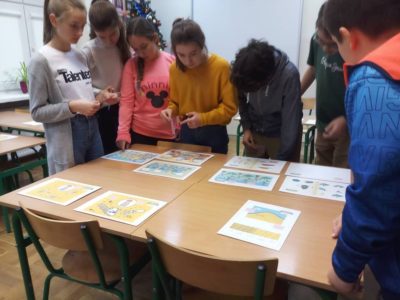
Working group member Rothsophal Nguon gave a teachers’ training workshop on the Expedition Mundus science game for classroom engagement to science, English, and ICT teachers at Aranch Sakor high school in Siem Reap, Cambodia, in October 2018. This workshop was held in collaboration with Caring for Cambodia (CFC), a non-governmental organisation that works towards improving learning and teaching conditions in rural Cambodia. The participants were full time teachers from six different public high schools, who are supported by CFC to foster STEM education. They will become ambassadors within the CFC network of 21 schools to implement Expedition Mundus as well as adopting educational games as a teaching technique with their 300 peers and 6600 registered students.
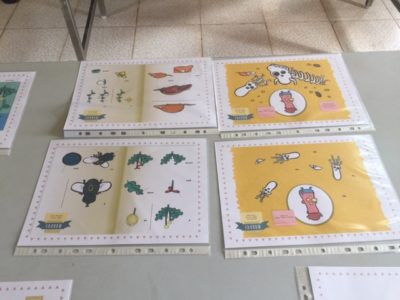
In August 2018, fifty Indonesian kids from Grades 4 to 6 played for the first time the Expedition Mundus game. Spearheaded by the Expedition Mundus group co-lead Felycia Edi Soetaredjo (Indonesia), the kids from the Curah Cottok Village in East Java, Indonesia learned for a day how to be a scientist as they explored the planet of the Mundians. Felycia translated the Mundus game in the local language, Bahasa Indonesia, which was then used in this outreach activity. This is part of the working group’s effort to promote the game in the hope of enticing more kids to pursue a career in science.
GYA member Lahcen EL Youssfi (Morocco) introduced the Expedition Mundus game to a group of teenagers at the American Language Center of Tetaoun in Tetouan, Morocco, during their summer English class in July 2018. Youssef Elhamdaoui, a teacher from the American Language Center of Tetaoun, helped facilitated the activity. Moroccan teenagers found the game very remarkable as they participated in the thinking and answering of questions. To make the game more exciting for them, a prize was awarded to the pair who got the highest scores. A follow-up event was conducted by the teacher in September with teachers from the American Language Center playing the Mundus Game for the first time. These events marked the beginning of making the Expedition Mundus game a popular learning activity in Morocco.
Working group member Mary Donnabelle Balela (Philippines) included the Expedition Mundus Game in an outreach programme by the Sustainable Electronic Materials group (SEM) from the Department of Mining, Metallurgical, and Materials Engineering, University of the Philippines Diliman, in schools in the Philippines in July 2018. For a detailed mission report see here.
Working group co-lead Thomas Edison dela Cruz took the Mundus game to Brunei in January 2018. Thirty-nine Grade 9 students, aged 13 – 14 years, from St Andrew’s School in Brunei Darussalam, played the Expedition Mundus Game as part of their school’s enrichment seminar. The students were initially grouped and then given time to search for clues from informational posters included in the game to answer the questions assigned to them. Thomas also delivered a lecture on fungi and their application in drug discovery to enhance the learning of the students. This activity was part of the effort of the working group to popularise the game globally in the hope of inspiring the next generation of scientists.
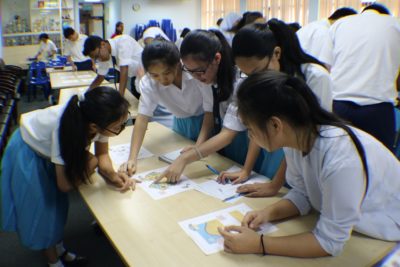
Hebrew version of Expedition Mundus (2018)
In February 2018, GYA alumnus Oded Hod and members from the Israel Young Academy translated the game into Hebrew. A limited number of hardcopies has been printed and the Hebrew version of the game is currently being tested and evaluated in several elementary, middle, and high-schools in Israel. See here for the Hebrew version of the game.
Working group co-lead Rothsophal Nguon took the Mundus game to Thailand, where she hosted a distribution workshop for graduate students and high school teachers at the Faculty of Education at Naresuan University in December 2017. The workshop with 19 participants from many different countries promoted the game as a science education tool and as an example of classroom best practice. The workshop showed that translations of the game into students’ first language would enable players to concentrate on the content of the game without dealing with potential language difficulties.On the other hand, the English-language version could be suited to help students in language classes engage in critical thinking in an interactive classroom environment and move beyond translated vocabularies and simply memorising content.
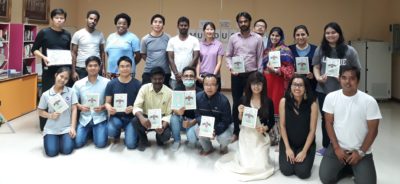
Working group co-lead Thomas Edison dela Cruz and the Department of Biological sciences of the University of Santo Tomas facilitated a science outreach activity for children in the Philippines. Sixteen kids, aged 8–12 years, from an urban-poor community in the Philippines experienced playing the Expedition Mundus Game as part of a I LAB SCIENCE event, which allowed them to experience how to be a scientist as they explored the fictional world of the Mundians.
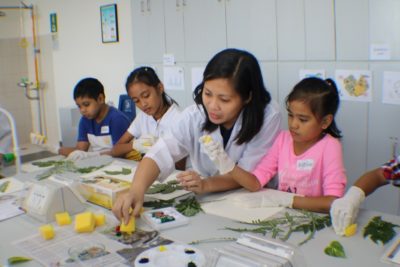
Working group co-leads Rothsophal Nguon and Thomas Edison dela Cruz introduced Expedition Mundus at the Higher Education Leadership Academy (AKEPT) to more than 40 participants from eleven nations at the ASEAN Science Leadership Programme in September 2017. They also delivered a set of the game to the Young Scientists Network–Academy of Sciences Malaysia (YSN-ASM) to stimulate wider use of Expedition Mundus in Malaysia as well as to support YSN-ASM’s science education outreach.
Rothsophal Nguon with some of her colleagues from the Paññāsāstra University of Cambodia introduced the game at a workshop in Siem Reap, Cambodia, in August 2017. Teachers and education programme managers learned how to set up and experience the game, so that they can request their own sets of this game and implement it at their own institutions for teaching staff and pupils.
Translation of Expedition Mundus into English
After finally resolving complicated licensing issues, the game was officially translated to English from its Dutch original, and presented to the new generation of GYA members at the AGMs 2014 and 2015 with a view to forming a group of members that would be trained to showcase the game in their countries. As an immediate result, the game was played in the Philippines in June 2015.
At the 2012 GYA AGM in South Africa, members positively tested the game for potential intercultural sensitivities and improved a preliminary translation from Dutch into English. Then they successfully played it with school children in South Africa during outreach activities following the AGM.
A video was then made, explaining the game to a wider audience.